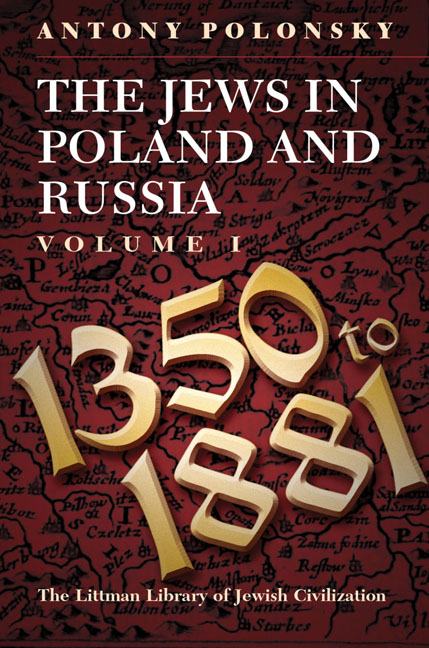Book contents
- Frontmatter
- Dedication
- Acknowledgements
- Contents
- List of Maps
- List of Tables
- Note on Transliteration
- Note on Place Names
- Maps
- General Introduction
- PART I JEWISH LIFE IN POLAND–LITHUANIA TO 1750
- PART II ATTEMPTS TO TRANSFORM AND INTEGRATE THE JEWS, AND THE JEWISH RESPONSE, 1750–1880
- Glossary
- Bibliography
- Index
6 - The Last Years of the Polish–Lithuanian Commonwealth
- Frontmatter
- Dedication
- Acknowledgements
- Contents
- List of Maps
- List of Tables
- Note on Transliteration
- Note on Place Names
- Maps
- General Introduction
- PART I JEWISH LIFE IN POLAND–LITHUANIA TO 1750
- PART II ATTEMPTS TO TRANSFORM AND INTEGRATE THE JEWS, AND THE JEWISH RESPONSE, 1750–1880
- Glossary
- Bibliography
- Index
Summary
Everyone admits that this splendid fabric of our republic mole propria ruit [is in a state of collapse], that it must be succoured, that it indeed cannot subsist much longer without a miracle … Are our walls secure? The gates are open on all sides, the enemy enters the innermost reaches of our land, imposes contributions, starts fires, and takes prisoners. How can a country subsist without justice in its law courts, without control in its councils, and without order in its polity?
STANISŁAW LESZCZYŃSKI, 1734Our laws regarding the Jews are wrong. Their situation, outside a class, is wrong. It is wrong to place power over them in the hands of private individuals or special Jewish bureaucrats. It is wrong to consider them an evil nation and to offer them no fatherland. Worst of all is that we allow them to live with special laws and customs. Owing to this, they appear as a corpus in corpore, a state within a state; in view of the fact that Jewish laws and rites are different from ours, such a state of things gives rise to conflicts, confusion, mutual distrust, contempt, and hatred.
MATEUSZ BUTRYMOWICZ, February 1789ATTEMPTS TO REFORM THE POLITICAL AND SOCIAL SYSTEM OF THE COMMONWEALTH
THE REIGN of the last king of Poland, Stanisław August Poniatowski, who was elected in 1764, was characterized by an attempt, in accordance with the political principles of the Enlightenment, to reform the institutions of the Polish–Lithuanian Commonwealth. The need for radical change was widely recognized. According to the reformer Fr. Stanisław Staszic, writing in 1790, ‘The whole of Europe is already in the eighteenth century [while] Poland is still in the fifteenth century.’
Indeed Enlightenment ideas and calls for reform had not been entirely absent even in the period of Saxon rule between 1697 and 1763. The taxation system had been placed on a somewhat better footing as a consequence of the political settlement ratified at the Silent Sejm in 1717. Polish finances now had, for the first time, something approximating to a budget.
- Type
- Chapter
- Information
- The Jews in Poland and RussiaVolume I: 1350 to 1881, pp. 191 - 222Publisher: Liverpool University PressPrint publication year: 2009

